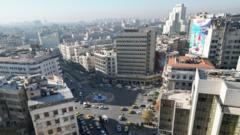In a recent military meeting, President Putin's deliberate omission of Syria highlights the Kremlin's shifting priorities and its diminishing foothold in the region.
**Putin's Silence on Syria Amidst Focus on Ukraine: A Sign of Russia’s Waning Influence?**

**Putin's Silence on Syria Amidst Focus on Ukraine: A Sign of Russia’s Waning Influence?**
As the situation in Syria grows increasingly precarious for Russia, President Putin prioritizes Ukraine over comments on its ally Bashar al-Assad's collapse.
As Russian President Vladimir Putin convened a meeting with high-ranking military officials in Moscow on December 16, 2024, notable was his absence of comment regarding the escalating turmoil in Syria. The hour-long televised gathering, largely centered on NATO and the ongoing conflict in Ukraine, saw no mention of Syria, where regime change has left Russia's strategic interests hanging in the balance.
The fall of Bashar al-Assad, once a staunch ally for Moscow, marks an essential shift in the dynamics of the region. While the Kremlin grapples with the implications of this change, military analyst Anton Mardasov from Moscow noted that discussing al-Assad's fate is "a painful topic" for Russian leaders, suggesting it's politically wiser to remain silent. This contrasts sharply with last year’s defense minister Sergei Shoigu, who celebrated the presence of Russian forces in Syria and elsewhere as stabilizing forces.
The situation surrounding Syria is increasingly complicated for Russia, especially given that its peacekeeping troops have already withdrawn from the Nagorno-Karabakh region, signaling a broader decline in Russian influence in both the Caucasus and the Middle East. The eclipse of al-Assad’s regime could jeopardize Russia's strategic military bases in Syria, further undermining its historical role as a power broker in the region.
As the war in Ukraine dominates the Kremlin’s focus, the Russian government appears to be grappling with the reality of its reduced capacity to assert influence abroad, a significant turnaround from its previous military engagements. With an absence of public discussion around Syria, questions remain about Russia’s future role in a shifting geopolitical landscape where its priorities are increasingly called into question.
The fall of Bashar al-Assad, once a staunch ally for Moscow, marks an essential shift in the dynamics of the region. While the Kremlin grapples with the implications of this change, military analyst Anton Mardasov from Moscow noted that discussing al-Assad's fate is "a painful topic" for Russian leaders, suggesting it's politically wiser to remain silent. This contrasts sharply with last year’s defense minister Sergei Shoigu, who celebrated the presence of Russian forces in Syria and elsewhere as stabilizing forces.
The situation surrounding Syria is increasingly complicated for Russia, especially given that its peacekeeping troops have already withdrawn from the Nagorno-Karabakh region, signaling a broader decline in Russian influence in both the Caucasus and the Middle East. The eclipse of al-Assad’s regime could jeopardize Russia's strategic military bases in Syria, further undermining its historical role as a power broker in the region.
As the war in Ukraine dominates the Kremlin’s focus, the Russian government appears to be grappling with the reality of its reduced capacity to assert influence abroad, a significant turnaround from its previous military engagements. With an absence of public discussion around Syria, questions remain about Russia’s future role in a shifting geopolitical landscape where its priorities are increasingly called into question.





















